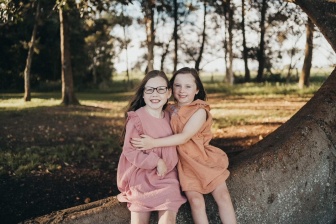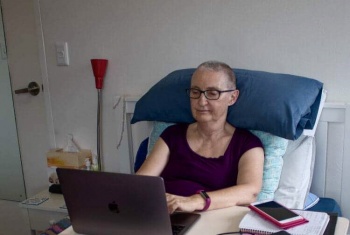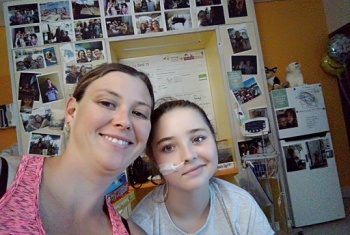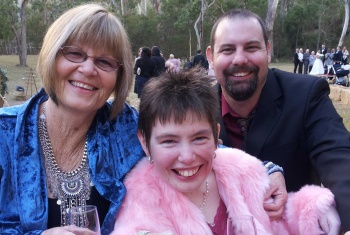Hunter Valley sisters, 10-year-old Keeley and 5-year-old Delaney Reading are not your average junior athletes – they both had strokes before they were a few months’ old.
And though both live with cerebral palsy and other disabilities caused by their strokes, the two girls are thriving, attending school and being actively involved in sports, thanks to early intervention therapies and support through the NDIS.
Keeley and Delaney’s mum Ara-Jane Reading says her daughters need regular exercise physiology to maintain their flexibility, fitness and strength – and they have continued to receive support during lockdown.
“The girls have access to a phenomenal exercise physiologist who helps them to move their body in a different way, helping to strengthen their weaker side,” she said. “If they didn’t have that therapy now, they could deteriorate, so we’re incredibly grateful that is continuing.”
During lockdown, the girls also have access to support workers so they can continue to access therapies.
“Having that NDIS support is allowing us to still go to work and the girls to go to therapy, so yeah, it’s amazing,” Ara-Jane said.
Keeley and Delaney are among the hundreds of young Australians who have had strokes before their first birthday every year.
In Keeley’s case, she was yet to be born, and doctors expected the worst.
“I was 33 weeks pregnant, and they said she had a 10% chance of survival and if she did live, she would never walk, talk, or see,” Ara-Jane said.
Keeley, it turned out, had other ideas.
“She came out kicking and screaming and crying like any child would,” Ara-Jane said. “She has been our little ray of sunshine ever since.”
Keeley has cerebral palsy, epilepsy and significant vision impairment due to her stroke. But with determination, early intervention and NDIS support, she has been upending doctors’ predictions.
"She walked into school by herself on the first day of school, turned around and waved at us. It was amazing,” Ara-Jane said.
Now 10, Keeley attends school and actively participates in sports, including biking, swimming, and running—not to mention, the junior Triathlon circuit.
“There are things she can’t do because she can’t use her right hand at all, but it’s actually pretty amazing what she can do,” Ara-Jane said. “She has never let anything stop her, she never says she can’t do something.”
When Keeley was five, her young sister Delaney was born. Only eight weeks later, Delaney also had a stroke. Ara-Jane admits her mental health took a dive after Delaney’s diagnosis.
But rather than ‘sit there and wallow’, she made the conscious decision to do something positive to help manage her stress.
“I wanted to do a triathlon, and I just fell in love with it,” she said. “The girls would come and watch and then Keeley wanted to do it too. Then Delaney is like, ‘Well, I want to do something too’. So, it’s a whole family thing that we all do together.
“I’ve never cotton-wooled my girls and always pushed them to be out there doing stuff. I’m like ‘whatever Mum can do, we can try for you as well’, and that’s where NDIS has been amazing.”
Ara-Jane says NDIS support is helping both her daughters pursue their goals and live their best lives, reaching milestones doctors never thought possible.
“Keeley is learning to write, she’s learning to tell the time, she’s learning the days of the week,” she said. “She’s put it up on a calendar and she’s learning how to put it into the ipad so she knows when she has therapy and all that kind of stuff, and she was never supposed to be able to do that.”
Keeley and Delaney’s NDIS plans fund a range of other therapeutic and assistive supports, including physical, occupational and speech therapies.
They also have funding for assistive equipment, including special posture and running prams, which they use when they are too tired to keep walking or running.



